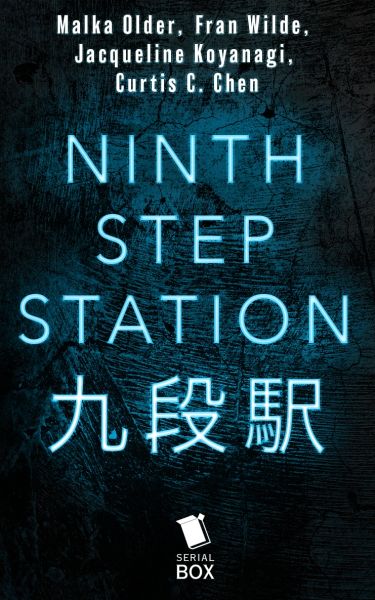Laying Down the Law
Ninth Step Station
By Curtis C. Chen, Malka Older, Fran Wilde & Jacqueline Koyanagi

8 Jan, 2019
0 comments
Malka Older, Fran Wilde, Jacqueline Koyanagi, and Curtis C. Chen’s 2018 Ninth Step Station is an anthology of serial shared-world cyberpunk fiction. It is published by Serial Box, who (to quote their site):
Serial Box is a publishing company and mobile app that produces and delivers team-written serialized fiction. We blend story production and distribution practices from television, book publishing and narrative podcasting to create professionally crafted serials that fit your life.
Following earthquake and Chinese invasion, Tokyo is divided between Chinese occupation forces, American forces, and of course the Japanese themselves. Crime is still a fact of life. It is up to Tokyo Metropolitan Police officers like Miyako Korida to deal with it. Because there is no job that cannot be made more complicated, Miyako has the privilege of partnering with Peacekeeper Lieutenant Emma Higashi of the US Navy.
Episode 1: The Faceless Body by Curtis C. Chen
Why would someone stab an insignificant businessman, and what, if anything, does it have to do with a container illegally diverted to the Chinese sector? And will it be possible to convince American Emma not to wave her gun around?
Episode 2: The Bodiless Arm by Fran Wilde
A severed arm hidden in a locker is a strong hint that a crime has been committed, The fingerprints have been erased (not that it would have been possible to identify the victim even with the fingerprints; the Tokyo fingerprint database was lost in the quake). Without knowing the victim, determining motive and guilty party will be even harder.
Episode 3: The Fallen Executive by Curtis C. Chen
Why shove a businessman to his death from the top of a Tokyo skyscraper?
Episode 4: The Blackout Killer by J Koyanagi
What provoked a brutal murder in the midst of a Tokyo blackout?
Episode 5: The Deadly Defection by Malka Older
Why was a senior American functionary targeted for poisoning?
Episode 6: The Stolen Xiǎohái by Curtis C. Chen
Who kidnapped a senior Chinese officer’s daughter?
Episode 7: The Loud Politician by Fran Wilde
What provoked the arson murder of a high ranking councilwoman?
Episode 8: The Clawed Limb by J Koyanagi
What’s causing prostheses to run homicidally amok?
Episode 9: The Assassin’s Nest by Fran Wilde & Curtis C. Chen
Why an assassination at what was supposed to be a peace conference?
Episode 10: The Foreign Mischief by Malka Older
Who killed a rabble-rousing politician?
~oOo~
The idea that the US might be a useful and reliable partner in peace-keeping activities seems oddly dated. Perhaps this is like all those novels featuring a vibrant Soviet Union that came out in the early 1990s. It might be best to read this as alternate history.
In fact, the political set-up in this setting is peculiar; the major players are the US and China1, with Japan as their playing field. ASEAN favours Japan. Russia is name-checked but not directly involved. Aside from some meaningless shouting in the UN, it’s as though the entire planet is happy to regard the conflict in Japan as a purely American versus Chinese affair. One is reminded of all those WWII movies where the Allies are essentially the Americans and Airstrip One.
Police procedurals seem like a good fit for American authors, at least judging by the quantity of procedurals that nation generates. There’s a tendency to divide the population into cops, victims, and crooks, with the division between the last two often blurred. Ninth Step tries to reach beyond this: the military and political situation complicates every investigation, even when it is not directly relevant. The individual cases work as mysteries, but they are also clues to the larger political setting.
Peculiar world-building choices aside, a reasonable example of near-future procedurals.
Ninth Step Station is available here.
1: North Korea played a role in provoking the conflict but is otherwise irrelevant.
